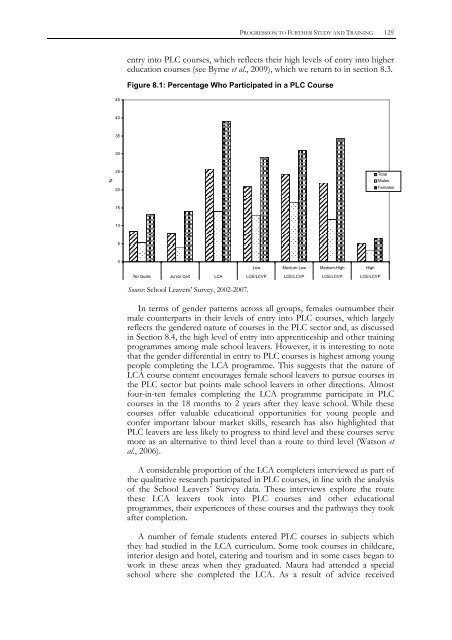Student Experiences of the Leaving Certificate Applied Programme
Student Experiences of the Leaving Certificate Applied Programme
Student Experiences of the Leaving Certificate Applied Programme
Create successful ePaper yourself
Turn your PDF publications into a flip-book with our unique Google optimized e-Paper software.
PROGRESSION TO FURTHER STUDY AND TRAINING 129entry into PLC courses, which reflects <strong>the</strong>ir high levels <strong>of</strong> entry into highereducation courses (see Byrne et al., 2009), which we return to in section 8.3.Figure 8.1: Percentage Who Participated in a PLC Course45403530%2520TotalMalesFemales151050Low Medium-Low Medium-High HighNo Quals Junior Cert LCA LCE/LCVP LCE/LCVP LCE/LCVP LCE/LCVPSource: School Leavers’ Survey, 2002-2007.In terms <strong>of</strong> gender patterns across all groups, females outnumber <strong>the</strong>irmale counterparts in <strong>the</strong>ir levels <strong>of</strong> entry into PLC courses, which largelyreflects <strong>the</strong> gendered nature <strong>of</strong> courses in <strong>the</strong> PLC sector and, as discussedin Section 8.4, <strong>the</strong> high level <strong>of</strong> entry into apprenticeship and o<strong>the</strong>r trainingprogrammes among male school leavers. However, it is interesting to notethat <strong>the</strong> gender differential in entry to PLC courses is highest among youngpeople completing <strong>the</strong> LCA programme. This suggests that <strong>the</strong> nature <strong>of</strong>LCA course content encourages female school leavers to pursue courses in<strong>the</strong> PLC sector but points male school leavers in o<strong>the</strong>r directions. Almostfour-in-ten females completing <strong>the</strong> LCA programme participate in PLCcourses in <strong>the</strong> 18 months to 2 years after <strong>the</strong>y leave school. While <strong>the</strong>secourses <strong>of</strong>fer valuable educational opportunities for young people andconfer important labour market skills, research has also highlighted thatPLC leavers are less likely to progress to third level and <strong>the</strong>se courses servemore as an alternative to third level than a route to third level (Watson etal., 2006).A considerable proportion <strong>of</strong> <strong>the</strong> LCA completers interviewed as part <strong>of</strong><strong>the</strong> qualitative research participated in PLC courses, in line with <strong>the</strong> analysis<strong>of</strong> <strong>the</strong> School Leavers’ Survey data. These interviews explore <strong>the</strong> route<strong>the</strong>se LCA leavers took into PLC courses and o<strong>the</strong>r educationalprogrammes, <strong>the</strong>ir experiences <strong>of</strong> <strong>the</strong>se courses and <strong>the</strong> pathways <strong>the</strong>y tookafter completion.A number <strong>of</strong> female students entered PLC courses in subjects which<strong>the</strong>y had studied in <strong>the</strong> LCA curriculum. Some took courses in childcare,interior design and hotel, catering and tourism and in some cases began towork in <strong>the</strong>se areas when <strong>the</strong>y graduated. Maura had attended a specialschool where she completed <strong>the</strong> LCA. As a result <strong>of</strong> advice received

















